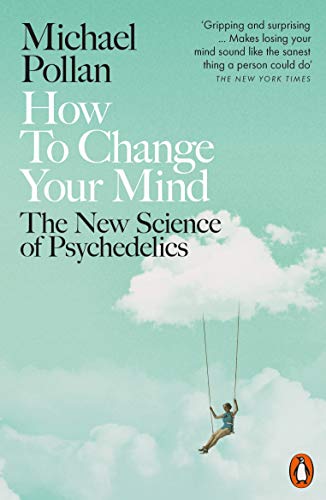How to Change Your Mind: The New Science of Psychedelics
3.000,00 د.ج
The No.1 New York Times Bestseller’Gripping and surprising … Pollan makes losing your mind sound like the sanest thing a person could do’ The New York Times Book ReviewCould psychedelic drugs change our worldview? Join Michael Pollan on a journey to the frontiers of the human mind.Diving deep into an extraordinary world – from shamans and magic mushroom hunts to the pioneering labs mapping our brains – and putting himself forward as a guinea-pig, Michael Pollan has written a remarkable history of psychedelics and a compelling portrait of the new generation of scientists fascinated by the implications of these drugs. How to Change Your Mind is a report from what could very well be the future of consciousness.’A sweeping and often thrilling chronicle of the history of psychedelics, all interwoven with Pollan’s adventures as a psychedelic novice. This is a serious work of history and science, but also one in which the author, under the influence of toad venom, becomes convinced he’s giving birth to himself’ Oliver Burkeman, Guardian’A mind-altering book … full of transformations’ Richard Godwin, Evening Standard’An irresistible blend of history, research and personal experience. In terms of the psychedelic wave, the book is the big kahuna, the Big Bang moment for a movement that is gathering force’ John McKenna, Irish Times’Entertaining and engrossing’ Paul Laity, Financial Times’Deeply absorbing, wise and beautifully written’ Mick Brown, Literary Review’An astounding book’ Andrew Sullivan, New York Magazine
The No.1 New York Times Bestseller’Gripping and surprising … Pollan makes losing your mind sound like the sanest thing a person could do’ The New York Times Book ReviewCould psychedelic drugs change our worldview? Join Michael Pollan on a journey to the frontiers of the human mind.Diving deep into an extraordinary world – from shamans and magic mushroom hunts to the pioneering labs mapping our brains – and putting himself forward as a guinea-pig, Michael Pollan has written a remarkable history of psychedelics and a compelling portrait of the new generation of scientists fascinated by the implications of these drugs. How to Change Your Mind is a report from what could very well be the future of consciousness.’A sweeping and often thrilling chronicle of the history of psychedelics, all interwoven with Pollan’s adventures as a psychedelic novice. This is a serious work of history and science, but also one in which the author, under the influence of toad venom, becomes convinced he’s giving birth to himself’ Oliver Burkeman, Guardian’A mind-altering book … full of transformations’ Richard Godwin, Evening Standard’An irresistible blend of history, research and personal experience. In terms of the psychedelic wave, the book is the big kahuna, the Big Bang moment for a movement that is gathering force’ John McKenna, Irish Times’Entertaining and engrossing’ Paul Laity, Financial Times’Deeply absorbing, wise and beautifully written’ Mick Brown, Literary Review’An astounding book’ Andrew Sullivan, New York Magazine
| Editeur |
|---|
Produits similaires
The Uninhabitable Earth: A Story of the Future
'An epoch-defining book' Matt Haig
'If you read just one work of non-fiction this year, it should probably be this' David Sexton, Evening Standard
It is worse, much worse, than you think.
The slowness of climate change is a fairy tale, perhaps as pernicious as the one that says it isn't happening at all, and if your anxiety about it is dominated by fears of sea-level rise, you are barely scratching the surface of what terrors are possible, even within the lifetime of a teenager today.
Over the past decades, the term "Anthropocene" has climbed into the popular imagination - a name given to the geologic era we live in now, one defined by human intervention in the life of the planet. But however sanguine you might be about the proposition that we have ravaged the natural world, which we surely have, it is another thing entirely to consider the possibility that we have only provoked it, engineering first in ignorance and then in denial a climate system that will now go to war with us for many centuries, perhaps until it destroys us. In the meantime, it will remake us, transforming every aspect of the way we live-the planet no longer nurturing a dream of abundance, but a living nightmare.
An Anthropologist on Mars
The Hidden Life of Trees: What They Feel, How They Communicate
A Higher Loyalty: Truth, Lies, and Leadership
Man’s Search For Meaning: The classic tribute to hope from the Holocaust
'A book to read, to cherish, to debate, and one that will ultimately keep the memories of the victims alive' John Boyne, author of The Boy in the Striped Pyjamas
A prominent Viennese psychiatrist before the war, Viktor Frankl was uniquely able to observe the way that both he and others in Auschwitz coped (or didn't) with the experience. He noticed that it was the men who comforted others and who gave away their last piece of bread who survived the longest - and who offered proof that everything can be taken away from us except the ability to choose our attitude in any given set of circumstances. The sort of person the concentration camp prisoner became was the result of an inner decision and not of camp influences alone. Frankl came to believe man's deepest desire is to search for meaning and purpose. This outstanding work offers us all a way to transcend suffering and find significance in the art of living.
The 48 Laws Of Power
Some laws teach the need for prudence ("Law 1: Never Outshine the Master"), the virtue of stealth ("Law 3: Conceal Your Intentions"), and many demand the total absence of mercy ("Law 15: Crush Your Enemy Totally"), but like it or not, all have applications in real life.
Illustrated through the tactics of Queen Elizabeth I, Henry Kissinger, P. T. Barnum, and other famous figures who have wielded--or been victimized by--power, these laws will fascinate any reader interested in gaining, observing, or defending against ultimate control.









